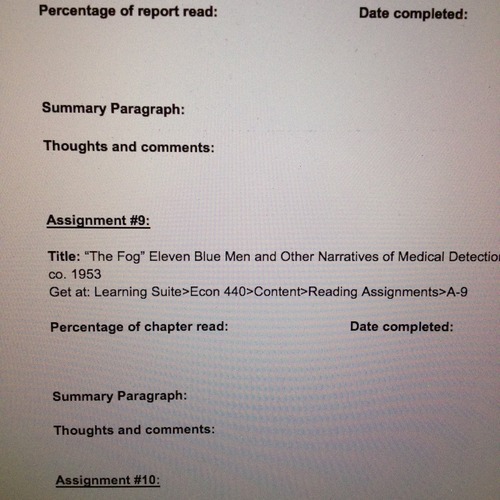As you probably know by now, I absolutely love BYU. I love the Spirit that surrounds campus and I have had fantastic professors, classmates, neighbors, and friends who have motivated and challenged and inspired me. I am grateful for the Honor Code which I, and my fellow Cougars, signed upon admission and reaffirm our commitment to each year. I have observed during my years here at the Y, and find interesting, that many professors here behave differently than professors at any other university I’ve been to, especially when it comes to academic honesty.
For those who don’t know, part of the Honor Code commitment is to be honest in all things (and times and places). This expectation creates a very unique class structure here at BYU. At other universities I’ve attended, for example, attendance is monitored by a class roll which must be signed or marked each instructional period. Completion of pre-class reading assignments are checked by short reading quizzes. And those things happen here too. I have also experienced, however, professors at BYU who very much favor self-reporting on such things. After every class period in my Book of Mormon class, we were required to mark our attendance online (I came on time and participated, I was late and/or did not fully participate, I did not attend, etc) and what portion of the reading assignments we had completed before class.
Or I have assignments like this one, where I have to report how much of my reading I accomplished, and when:

It’s at times like these that I start to see the real beauty in the Honor Code (and wish I could go back to my honor-optional colleges where you could at least fake it when you didn’t do the reading). Through self-reporting like this, professors are likely to get much more accurate information about which students are doing the work than through other monitoring methods.
But why does this work??
You don’t have to be an economist to recognize that most people are self-serving. Indeed, that is human nature. The “natural man,” in scriptural terms. We are programmed to be self-interested and look out for our own well-being. Why, then, am I about to willingly admit that I only read two of the first 6 assignments on time…? Intuitively, academic dishonesty should always be the rational choice. So why isn’t it?
Well, we could talk about incentives. Not in the usual sense (I get no “prize,” per se, for being honest) but in the sense of avoiding negative consequences. Being naturally risk averse, honesty saves me the dis-utility of having to worry about the Honor Code office finding out about my violation, potentially losing my scholarship, or having to deal with other academic penalties. But honestly, even that explanation isn’t entirely accurate. The real reason that I’m willing to choose honesty over an academic boost is a strange phenomenon known as “integrity.”
Merriam-Webster defines integrity as “firm adherence to a code of especially moral or artistic values; incorruptibility.” To me, this invisible moral compass really does direct more of my life than I’d like to admit. The thought of bearing the weight of a guilty conscience is much more of a policing power than the threat of a run-in with Honor Code officials.
According to For the Strength of Youth, “Integrity means thinking and doing what is right at all times, no matter what the consequences. When you have integrity, you are willing to live by your standards and beliefs even when no one is watching.”
I readily admit, I don’t understand why this is a thing. I don’t understand why we choose to think and do the right thing, even when it is not to our advantage. Maybe someday I will work out an economic understanding for why such irrational behavior exists so commonly. For now, though, all I can attribute it to is the power of the Gospel and the Spirit in our lives.
For the natural man is an enemy to God, and has been from the fall of Adam, and will be, forever and ever, unless he yields to the enticings of the Holy Spirit, and putteth off the natural man and becometh a saint through the atonement of Christ the Lord, and becometh as a child, submissive, meek, humble, patient, full of love, willing to submit to all things which the Lord seeth fit to inflict upon him, even as a child doth submit to his father.
Mosiah 3:19
Behold, that which is of God inviteth and enticeth to do good continually; wherefore, every thing which inviteth and enticeth to do
Moroni 7:13
good, and to love God, and to serve him, is inspired of God.
Though I may not understand fully how, I know for a fact that the Atonement of Jesus Christ has the power to change our hearts. It can change and reform whatever overly complex utility function exists within our subconscious that governs all our choices and actions. It transforms us into a better version of ourselves. A version that, while perhaps irrational, has the moral courage to make right choices and reap the blessings. 🙂